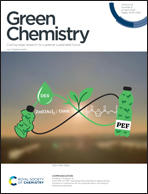Solvent-free transformation of levulinic acid into valeric acid and its esters using the nickel phosphine complex and metal triflate co-catalytic system†
Abstract
Under solvent-free conditions, we used the inexpensive nickel phosphine complex and metal triflate catalysts to directly convert biomass platform molecules of levulinic acid (LA) into valeric acid (VA). Valerate esters (VEs) were also obtained via a one-pot two-step method. LA was completely converted under mild conditions (180 °C and 1 MPa H2 for 10 h), and the yield of VA was 99.0%. The hydrogenation sites of the nickel phosphine complex promoted the hydrogenation reactions, and the Lewis acidity associated with metal triflate facilitated both ring-opening and esterification reactions. The strategy of separating the hydrogenation sites and the Lewis acid sites made the reaction pathway more explicit. Finally, the results of using biomass-derived carbohydrates to directly prepare ethyl valerate (EV) showed that the catalysts are compatible with the upstream LA preparation process.

- This article is part of the themed collection: 2022 Green Chemistry Hot Articles


 Please wait while we load your content...
Please wait while we load your content...